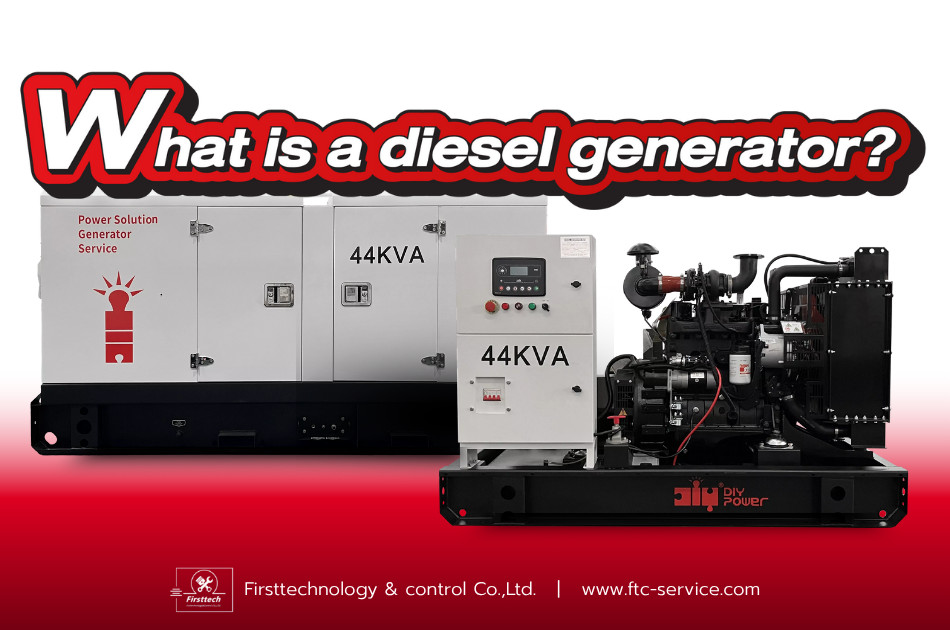

Article Difference between Biogas and Diesel Generators.
A generator is a device that converts mechanical energy into electrical energy through the principle of electromagnetic induction. Generators generally work in conjunction with internal combustion engines that use fuels such as diesel or biogas to drive a generator set to produce electricity.
Popular types of generators.
เครื่องกำเนิดไฟฟ้าไบโอแก๊ส (Biogas Generator)

Biogas Generator
Biogas generators are generators that use energy from biogas, which is obtained by fermenting food scraps, animal waste, or other organic waste through the process of anaerobic digestion. The advantage is that this type of generator is environmentally friendly, does not emit as much carbon as fossil fuel engines, saving long-term costs. If you have your own biogas production source, it will help reduce fuel costs significantly and is suitable for farms/agricultural factories. It can use existing waste to produce electricity efficiently. However, it is not suitable for moveable type because the system is quite complicated.
Proper use.
-
-
- Medium to large livestock farms.
- Food processing plant.
- Organic waste management center.
- Renewable energy projects.
-
เครื่องกำเนิดไฟฟ้าดีเซล (Diesel Generator)

Diesel Generator use diesel fuel to burn inside the engine to drive the generator. It is a very popular type in the industrial sector. It is durable and can be used continuously for a long time, suitable for heavy-duty work. It can be used in remote areas where there is no electricity from the grid. However, this type of generator is loud and emits smoke, making it unsuitable for residential areas or near communities. It also uses higher fuel costs than renewable energy systems.
Proper use.
- Construction site.
- Industrial plants.
- Hospitals or buildings that require a backup power system.
- Remote areas do not have access to power lines.
How to choose a generator that suits your application.
Choosing a generator is not just about price or brand, but should be considered in all aspects, especially suitability for usage. To ensure that your machine works at its best and
you don’t have to pay for maintenance or replace it often, let’s take a look at some important factors to consider.
- 1.Electrical power required (Watt or KVA) Know how much power you are using so that the machine does not exceed its capacity. One of the mistakes that people often overlook is choosing a generator with insufficient power, causing the machine to work too hard until it overheats or breaks easily.
- 2.Type of work used. The work determines the type of generator that is appropriate. Different uses require different generators, such as:
- Continuous Load: Used for several hours per day or all day every day, such as farms, factories, office buildings or construction sites, is suitable for diesel or biogas engines because they can support heavy loads well.
- Temporary Use: Not used often, used only during power outages, events or booths. A small, portable generator is required. A diesel generator is suitable because it is easy to use.
- 3.Installation area and environment Know where to install it to select the right size and type. Installing a generator must take into account the area, floor materials, humidity, and ventilation system, such as:
- If you have a large area, ready to install a gas system and bio-fermentation, a biogas machine is suitable.
- Wet or dusty areas such as animal sheds should use a soundproof, dustproof, and waterproof.
Summary: Choosing the Right Generator for a Sustainable Energy Future.
Both types of generators have their own advantages and limitations, so if you want an environmentally friendly system that reduces waste on your property, Biogas generators are an interesting option for the green energy era. If you need stable and heavy-duty electricity, diesel generators are the answer. And if you need flexibility or temporary use, but are not sure which model to choose or want more advice on designing, installing or calculating the right power for your home or business.
Related Articles

First Technology and Control Co., Ltd.
We manufacture and supply Biogas Generator Sets, as well as gasoline and diesel generators. Our products include complete control systems: Control Panels, ATS Controllers, AVR units, Generator Speed Control Units, and Gen-set Controllers.
Contact
- 109/1 Soi Bang Khun Thian 14, Samae Dam Sub-district, Bang Khun Thian District, Bangkok 10150, Thailand
- 084-093-3851
- 083-830-2629
- firsttechnology@hotmail.com
Copyright ©2025 | Powered by First Technology and Control Co., Ltd.

